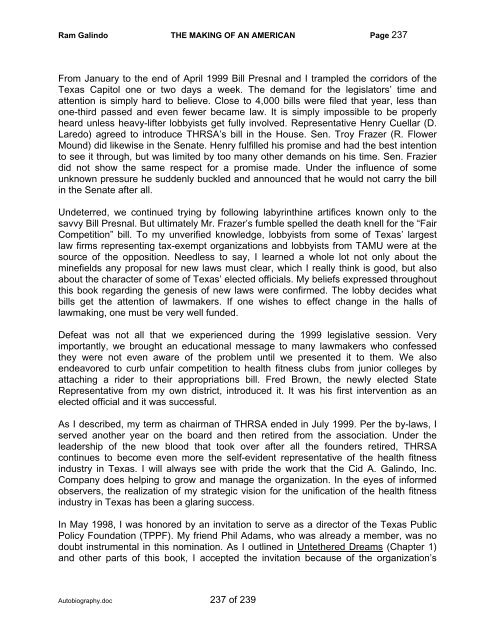Autobiography - The Galindo Group
Autobiography - The Galindo Group
Autobiography - The Galindo Group
Create successful ePaper yourself
Turn your PDF publications into a flip-book with our unique Google optimized e-Paper software.
Ram <strong>Galindo</strong> THE MAKING OF AN AMERICAN Page 237<br />
From January to the end of April 1999 Bill Presnal and I trampled the corridors of the<br />
Texas Capitol one or two days a week. <strong>The</strong> demand for the legislators’ time and<br />
attention is simply hard to believe. Close to 4,000 bills were filed that year, less than<br />
one-third passed and even fewer became law. It is simply impossible to be properly<br />
heard unless heavy-lifter lobbyists get fully involved. Representative Henry Cuellar (D.<br />
Laredo) agreed to introduce THRSA’s bill in the House. Sen. Troy Frazer (R. Flower<br />
Mound) did likewise in the Senate. Henry fulfilled his promise and had the best intention<br />
to see it through, but was limited by too many other demands on his time. Sen. Frazier<br />
did not show the same respect for a promise made. Under the influence of some<br />
unknown pressure he suddenly buckled and announced that he would not carry the bill<br />
in the Senate after all.<br />
Undeterred, we continued trying by following labyrinthine artifices known only to the<br />
savvy Bill Presnal. But ultimately Mr. Frazer’s fumble spelled the death knell for the “Fair<br />
Competition” bill. To my unverified knowledge, lobbyists from some of Texas’ largest<br />
law firms representing tax-exempt organizations and lobbyists from TAMU were at the<br />
source of the opposition. Needless to say, I learned a whole lot not only about the<br />
minefields any proposal for new laws must clear, which I really think is good, but also<br />
about the character of some of Texas’ elected officials. My beliefs expressed throughout<br />
this book regarding the genesis of new laws were confirmed. <strong>The</strong> lobby decides what<br />
bills get the attention of lawmakers. If one wishes to effect change in the halls of<br />
lawmaking, one must be very well funded.<br />
Defeat was not all that we experienced during the 1999 legislative session. Very<br />
importantly, we brought an educational message to many lawmakers who confessed<br />
they were not even aware of the problem until we presented it to them. We also<br />
endeavored to curb unfair competition to health fitness clubs from junior colleges by<br />
attaching a rider to their appropriations bill. Fred Brown, the newly elected State<br />
Representative from my own district, introduced it. It was his first intervention as an<br />
elected official and it was successful.<br />
As I described, my term as chairman of THRSA ended in July 1999. Per the by-laws, I<br />
served another year on the board and then retired from the association. Under the<br />
leadership of the new blood that took over after all the founders retired, THRSA<br />
continues to become even more the self-evident representative of the health fitness<br />
industry in Texas. I will always see with pride the work that the Cid A. <strong>Galindo</strong>, Inc.<br />
Company does helping to grow and manage the organization. In the eyes of informed<br />
observers, the realization of my strategic vision for the unification of the health fitness<br />
industry in Texas has been a glaring success.<br />
In May 1998, I was honored by an invitation to serve as a director of the Texas Public<br />
Policy Foundation (TPPF). My friend Phil Adams, who was already a member, was no<br />
doubt instrumental in this nomination. As I outlined in Untethered Dreams (Chapter 1)<br />
and other parts of this book, I accepted the invitation because of the organization’s<br />
<strong>Autobiography</strong>.doc 237 of 239


